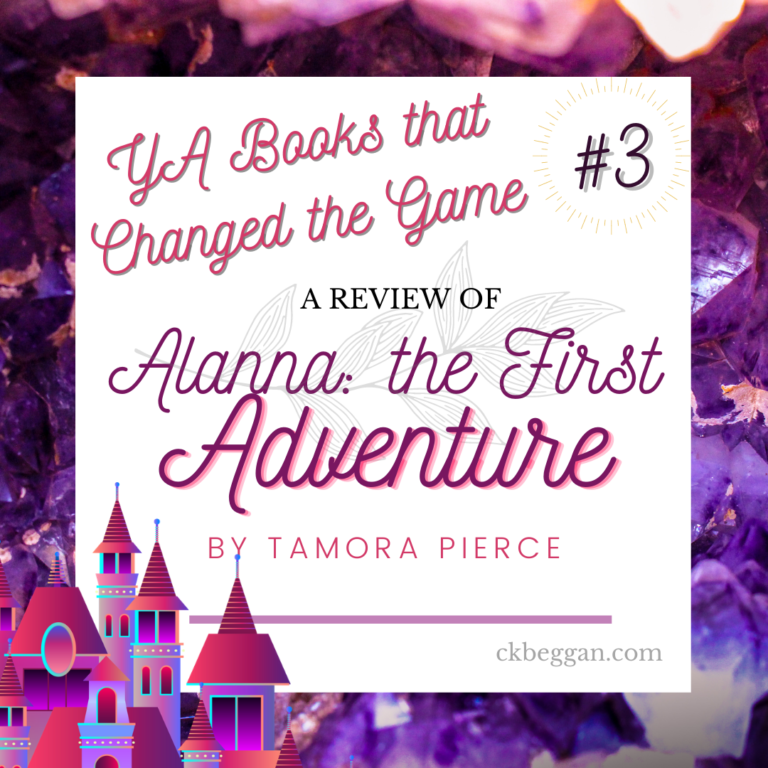I read this one 20+ years ago, and it’s stayed near and dear to my heart all this time. Which means I had to re-read it before posting this. I’m talking about the one, the only…

Alanna: The First Adventure, by Tamora Pierce (The Song of the Lioness, 1983, YA Fantasy/Adventure)
This one seems short compared to today’s YA fantasies, with a classic plot line and a wonderfully designed world (Pierce uses the same world for other series, including The Numair Chronicles and The Immortals—and often the same characters). The young, small hero(ine) overcomes her weaknesses through hard work, is brave and doesn’t back down as she strives to become a knight. She just has to pretend to be a boy to do it.
Alanna is a rough-and-tumble, capable and sometimes temperamental girl, and to her, it is completely not fair that she isn’t a boy. That honor goes to her twin brother Thom, her complete opposite: young Alanna is afraid of the magic she holds, while Thom loves it; Alanna is kind and considerate (one would say honorable and chivalrous), Thom not so much, though both twins have a mischievous streak; and Alanna loves hunting, sword play, riding horses, archery—you get the idea—while Thom sees little point to wielding things with points.
A switch is in order, with Alanna becoming Alan and going off to service at the palace, while Thom, destined for the same, goes to the City of the Gods to learn all that magic stuff Alanna hates. She doesn’t have to become a lady, and he doesn’t have to become a warrior.
But Alanna doesn’t get to leave magic entirely behind. She has a true gift for healing, and a warning from the gods says that she must heal to make up for the lives she’ll take as a warrior (you don’t hear anyone telling the real boys that; no wonder she doesn’t listen at first). For all her magic, even she can’t change her nature. Being a girl threatens to deny her everything she’s ever wanted; the strict gender roles of her time and country mean she can’t be herself.
Alanna’s non-stop adventure isn’t just a feminist tale, it’s a human one that every developing human could benefit from–and of course enjoy.
Many of the things Alanna thinks and says seem to suggest a transgender child; perhaps she would be if the story were written later, but that doesn’t appear to be Alanna’s theme. She always intends to reveal she’s a girl–after she becomes a knight, so they can no longer deny her. In a straightforward way that is part of (and not a high-horse diversion from) the story, Alanna is about the restrictions gender roles put on everyone, and how it affects a person’s destiny. Alanna defies it, but most of us struggle to, won’t or can’t. She’s a hero where heroes cannot tread. How many YA fantasies manage to show their readers that?
Other books in the genre, set in a prior period, manage a tough and adventuring gal on a horse—but like Ginger Rogers (she did the same as Fred Astaire, except backwards and in heels), YA fantasy heroines often have to do it all with long hair and a skirt or dress. Not Alanna. She fully embraces her kingdom’s male role, even if mother nature sometimes gets in her way. Even Aria Stark never has to pause for a period.
I wouldn’t have understood the value of all this, reading it for the first time as a young teen (I think the extent was: Girl becoming a knight! Thrashing the boys and proving herself! Yeah!). The way all of this is handled in Alanna is at just the right level for a young person, yet better appreciated as an adult.
At the same time, I can’t help wondering how much I already identified with Alanna’s plight when I was young, and how much every young teenage or pre-teen girl does. I didn’t remember Alanna’s lamentations about being a girl who’s not allowed to do things, which means I either thought it was just part of the story and had nothing to do with today, or on some level took it as true. Now it stands out. It almost seems too obvious.
Other parts of Alanna: the First Adventure I remembered clear as day, like a trip back through time (a truly great book, or song, can do that). I remembered reading one particular scene with the Thief King George on my grandparents’ couch one summer, like it’s a photograph. It very happily took me back. Still, on this re-read, the level of Alanna’s ire at being stuck as a girl surprised me.
It’s not just her, though: her brother Thom wants nothing to do with the path expected of him as a boy-slash-son, which is neatly done; he also has to pretend to be less intelligent and talented than he is, so he doesn’t earn undue attention and won’t be perceived as a threat. This isn’t a feminist tale, it’s a human one. And I would recommend it to any developing human.
All of that was just about the premise, which matters, of course, but doesn’t do it justice. Alanna: the First Adventure is also a lovely read, and Pierce’s writing can draw a person in and keep them there, even if you only give her less than a page. After all these years, I can’t stop myself from rooting for Alanna, an undersized, courageous and stubborn heroine, like she’s real. Then again, why would anyone want to try?
Up next in this blog series: Wild Magic (The Immortals), also by Tamora Pierce.